Turkey on the path of democracy
By Gholam Ali Latifi
 Turkey’s ruling party, led by Prime Minister Recep Tayyip Erdogan, won 326 seats in the recent parliamentary election. This victory means that the party can continue its efforts to improve the Turkish economy and raise the country’s stature in the international arena and move forward with the process of demilitarizing Turkish politics.
Turkey’s ruling party, led by Prime Minister Recep Tayyip Erdogan, won 326 seats in the recent parliamentary election. This victory means that the party can continue its efforts to improve the Turkish economy and raise the country’s stature in the international arena and move forward with the process of demilitarizing Turkish politics.
However, Erdogan and his colleagues in the Justice and Development Party (AKP) were not able to win the two-thirds of the seats of the 550-member parliament required to make amendments to the constitution on their own. Therefore, the AKP will require the cooperation of other parties in the parliament to deal with issues such as the Kurdish minority.
Based on the percentage of the vote the various parties received and the increase in the number of seats they have won, many political observers in Turkey believe that the recent election was in fact a general victory for all groups that participated in the election. All groups have gained a proper voice in the parliament and no party has achieved the supermajority required to amend the constitution.
Although 15 political parties participated in the recent election, the main competition was between the three major parties, the AKP, led by Recep Tayyip Erdogan, the People’s Republic Party, led by Kemal Kilicdaroglu, and the Nationalist Movement Party, led by the Devlet Bahceli. An alliance formed by other independent political groups, mainly composed of Kurdish activists, was also among the main contenders.
According to current Turkish law, parties that fail to gain at least 10 percent of the vote are excluded from parliament and receive no seats. The opponents of this law believe it is actually a pretext to prevent the minority Kurds from having a say in the parliament. Therefore, the unaffiliated independent candidates formed an alliance in the recent election to thwart the plot.
The decision by the Kurdistan Workers’ Party (PKK) — founded by Abdullah Ocalan and currently led by Murat Karayilan — to boycott the June 12 election was one of the other surprises of the recent poll. But the boycott was not welcomed in the Kurdish regions and six out of ten Kurdish voters cast a ballot for the AKP.
The presence of women candidates on the lists of all parties was quite impressive, resulting in the election of 78 women, who now constitute 14 percent of the legislature. Women held 10 percent of the seats in the previous parliament. The election of six candidates currently incarcerated in prison was another interesting feature of the recent election.
In addition to the unprecedented democratic reform it enacted, Erdogan’s government has completely transformed Turkey’s economic and social landscape, and now, with a GDP of about 800 billion dollars, Turkey is a member of the G-20.
However, Erdogan’s opponents accuse him of using this success to acquire power and consolidate his position and the AKP’s position.
Many believe that the victory of the AKP in three consecutive parliamentary elections is the direct result of Erdogan’s leadership, which is based on his strong business instincts and his charismatic character. And many of his supporters regard Erdogan as the new sultan of modern Turkey.
However, his opponents say, “Sir, do not think so much of yourself. God is greater than you.” This attitude arose in response to the extreme overconfidence displayed by Erdogan and the other members of his party, who were quite certain that they would win the two-thirds of the seats of parliament required to amend the constitution.
Right after the election, Erdogan implicitly asked for the help of other parties, and promised that he and his party would modestly consult with all the opposition groups to pave the way for the drafting of a new constitution. It is in fact a new beginning on the path of establishing a real democracy in Turkey.
via tehran times : Turkey on the path of democracy.

Leave a Reply